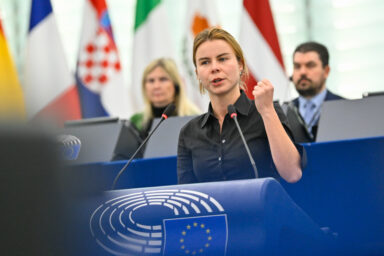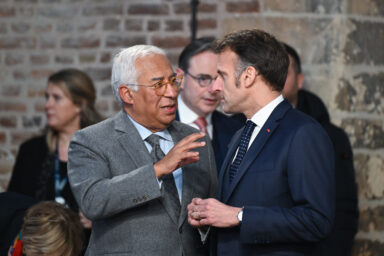When did you last see business, academia and civil society insiders dance to a single drum? The European Parliament’s fiscal committee, rarely a stage for magic, witnessed the trick on Thursday. Four distinguished speakers of various backgrounds agreed: EU energy taxes need a thorough overhaul.
“Targets alone will not deliver results,” the FISC committee heard on 20 November. Four speakers reminded the members of a simple truth: industry needs rules that do not change mid-project.
In last week’s Ecofin meeting, ministers did not reach an agreement on the Energy Tax Directive (ETD) compromise text, citing specific concerns with issues such as provisions on indexation, on the taxation of fuel used in the maritime and our aviation sectors, and on the tax treatment of natural gas and liquefied natural gas, as well as links with other climate-related files that remain open for negotiations. In this session, speakers discussed how the taxation measures taken to support the EU’s decarbonisation goals in the Clean Industry Deal can affect the taxation of energy and the current talks on the revisions of the said directive.
Shooting our own leg?
The expert speakers were Mariella Caruana, Senior Advisor of Taxation at Business Europe; Andreas Rüdinger of IDDRI, Coordinator for the Energy Transition in France; Professor Patrick Lenain, Senior Associate at the Council on Economic Policies; and Flaminia Tacconi of Bloom Association, Director of Subsidy Campaign. The implementation of energy taxes that support electrification and avoid incentivising the use of fossil fuels was preeminently under the spotlight.
Ms Caruana spoke first and set a stern tone. “The choices we make today will determine whether the technologies of tomorrow are invented and produced in Europe or elsewhere,” she warned. (It was also her who delivered the targets-to-results opening quote of this article.) OECD numbers, she said, show that annual global clean-energy investment must reach €5tn by 2030 if the world is to stay on a net-zero path. Europe alone faces an €800bn gap.
You might be interested
Creating fresh labels inside the ETD would sow confusion. — Mariella Caruana, Business Europe, Senior Advisor of Taxation
She gave her diagnosis in four bites. Taxation must stay technology-neutral, so renewable and low-carbon hydrogen, biomethane and advanced biofuels all enjoy a fair shot. Next comes legal clarity. “Creating fresh labels inside the ETD would sow confusion,” she argued, noting that terms such as renewable hydrogen already sit in other EU laws. Third, levies should reward carbon performance rather than feedstock origin. Fourth and most crucial is predictability. “If you are a company investing today, you’re really planning for the next fifteen to twenty-five years,” she said. Investors will flee if taxes yo-yo across borders.
A framework still on hold
Delays already cost money, Ms Caruana continued. The Danish Council presidency admits that no landing zone exists for a deal. That leaves firms facing diverging national taxes, ad-hoc indexation and hazy price signals. Boardrooms keep looking west or east for friendlier regimes. She urged MEPs to pair higher fossil-fuel rates with tools such as accelerated depreciation and targeted credits, or risk watching capital sail away.
Mr Rüdiger then let figures do the talking. “The energy bill for fossil energy imports in Europe had doubled in 2022,” he recalled. Over 2022-24 Europe spent €650bn more on those imports than in calmer years. Governments matched that with another €650bn in price shields. “All in all, we come to a figure of almost €1,000 per inhabitant of the European Union for each year,” he said. That sum might have built gigawatts of clean capacity; instead it paid foreign suppliers and domestic compensation.
Electrification is central to decarbonisation. — Professor Patrick Lenain, Senior Associate at the Council on Economic Policies
Subsidies add insult. Commission data list €350bn in energy aid for 2023, a third aimed straight at fossil fuels—twice the pre-crisis share. Aviation, shipping and trucking enjoy €50bn in fuel-tax breaks; petrol and diesel cars in five large states receive €40bn more. Mr Rüdiger shook his head. “Half of the subsidies to fossil energy that we see today do not have a deadline,” he lamented. Such open-ended gifts warp markets and blunt Europe’s carbon signal.
Sharper sticks, brighter carrots
His remedy is strict. Scrap the exemptions, bar any situation where renewables face heavier tax than fossil fuels, and raise minimum rates decisively. The current draft implies a carbon price near €50 a tonne, yet natural gas would pay sixty times less. With electrons still taxed more than molecules in many countries, electrification stalls. Without bolder moves, he said, Europe’s climate talk will stay cheap.
Professor Lenain offered global context and institutional cool. Higher fossil-fuel floors are, he said, “a much-needed overhaul of a directive that has become outdated.” They would reinforce the EU emissions-trading system and its new extension from 2028. Yet he fretted about weakness. “The proposal contains many long transition periods and escape clauses, which will reduce the effectiveness of the revised ETD,” he told the room. Competitiveness requires rules, not loopholes.
He praised one element. Lower floors on electricity would help, because “electrification is central to decarbonisation.” Power still supplies barely a fifth of final energy use, and the figure in transport languishes at two per cent. Cutting taxes on electrons would narrow Europe’s price gap with rivals and speed the shift from molecules. But price alone will not guarantee new factories. Tax credits now anchor industrial plans worldwide. France, Italy and the Netherlands each offer their own, yet that fragments the single market. Europe instead needs “a single, predictable framework for clean-tax incentives.”
Keep the tiller steady
Budgets are taut, so incentives must be lean. The Commission intends to track them through key performance indicators. Professor Lenain applauded the idea but wanted more: systematic data collection, ex-post cost-benefit reviews and routine dialogue with industry. Only hard numbers can prove that credits deliver additional investment rather than merely pad profits. He pointed deputies to a fresh Council on Economic Policies study—hurried into print for this hearing—that sets design rules for credits in hydrogen, steel, cement and petrochemicals. Success abroad, he noted, rests on clarity and permanence.
Ms Tacconi brought the debate sea-ward. For three decades Europe’s fishing fleets—especially the giant, diesel-hungry trawlers—have bought fuel free of excise. The waiver costs €1.5bn a year. More than half, she said, benefits industrial vessels that scrape seabeds while creating few local jobs. “The way we fish matters, and taxation is a powerful tool to make fisheries more just and more prosperous,” she said. In France fuel rebates form 63 per cent of all fisheries aid; half goes to industrial operators. That public cash “fuels the most destructive fishing gear.”
The way we fish matters, and taxation is a powerful tool to make fisheries more just and more prosperous. — Flaminia Tacconi, Director of Subsidy Campaign at the Bloom Association
The ecological cost is steep. Oceans absorb carbon, yet trawling releases it and hammers fish stocks. Fisheries sit outside the emissions-trading system, so the ETD is the lone channel for pricing their fuel. The draft, however, still tolerates lengthy grace periods. Ms Tacconi frowned: “It maintains tax exemptions that exist for over thirty years.” Parliament in 2023 resolved to kill fossil-fuel subsidies; it must now honour its own vow. If Council refuses, she said, the Commission should withdraw the proposal and propose a bolder text.
Economics of delay
Ms Tacconi’s warning echoed a recent letter from economists and marine scientists, unveiled during the ECOFIN debates. Fuel-tax rebates, they wrote, “are negative and not working from an economic perspective.” Europe’s Environment Agency says degraded ecosystems will dent competitiveness; actuaries speak of “planetary insolvency.” The message is the same: cheap diesel today will cost dear tomorrow.
Despite different angles, the four experts converged on one point. Europe needs a fiscal framework that punishes carbon, rewards clean choices and stays predictable. Ms Caruana pleaded for neutrality and permanence; Mr Rüdiger demanded price coherence; Professor Lenain called for discipline and a common rule-book; Ms Tacconi asked simply that taxpayers stop bankrolling destruction. All four fear that dithering will shove investment, innovation and even fish stocks beyond the Union’s reach.
The energy bill for fossil energy imports in Europe had doubled in 2022. — Andreas Rüdinger, IDDRI; Coordinator for the Energy Transition in France
Tax files demand unanimity in Council, and several capitals still cling to their waivers. Yet the Parliament now has testimony it can brandish. “The energy bill for fossil energy imports in Europe had doubled in 2022,” Mr Rüdiger told MEPs in plain words. Professor Lenain cautioned against “long transition periods and escape clauses.” Ms Tacconi said bluntly that the draft “maintains tax exemptions that exist for over thirty years.” None of those sentences is easy to ignore.
Deal or no deal?
FISC’s chair wrapped the session in under two hours, but its echoes may linger. If the Union wants hydrogen corridors, green-steel furnaces and healthier seas, it must align its taxes with its talk. Council can choose to haggle exemptions or match ambition with action. The witnesses have done their part; the next move belongs to ministers.











